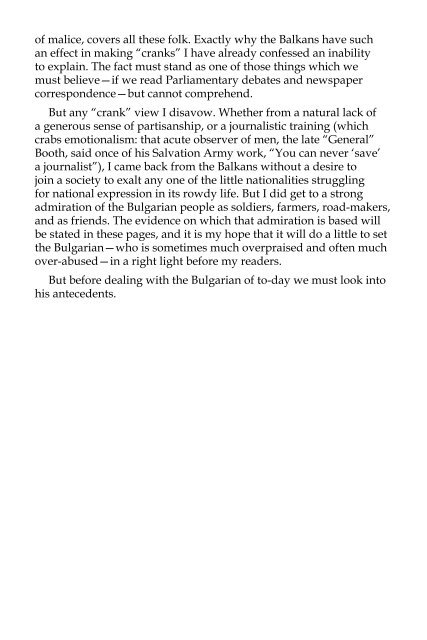Bulgaria e-book - iMedia
Bulgaria e-book - iMedia
Bulgaria e-book - iMedia
You also want an ePaper? Increase the reach of your titles
YUMPU automatically turns print PDFs into web optimized ePapers that Google loves.
of malice, covers all these folk. Exactly why the Balkans have such<br />
an effect in making “cranks” I have already confessed an inability<br />
to explain. The fact must stand as one of those things which we<br />
must believe—if we read Parliamentary debates and newspaper<br />
correspondence—but cannot comprehend.<br />
But any “crank” view I disavow. Whether from a natural lack of<br />
a generous sense of partisanship, or a journalistic training (which<br />
crabs emotionalism: that acute observer of men, the late “General”<br />
Booth, said once of his Salvation Army work, “You can never ‘save’<br />
a journalist”), I came back from the Balkans without a desire to<br />
join a society to exalt any one of the little nationalities struggling<br />
for national expression in its rowdy life. But I did get to a strong<br />
admiration of the <strong>Bulgaria</strong>n people as soldiers, farmers, road-makers,<br />
and as friends. The evidence on which that admiration is based will<br />
be stated in these pages, and it is my hope that it will do a little to set<br />
the <strong>Bulgaria</strong>n—who is sometimes much overpraised and often much<br />
over-abused—in a right light before my readers.<br />
But before dealing with the <strong>Bulgaria</strong>n of to-day we must look into<br />
his antecedents.<br />
Chapter II<br />
<strong>Bulgaria</strong> and the Death of the Roman Empire<br />
Probably not the least part of the interest which the traveller or<br />
the student will take in <strong>Bulgaria</strong> is the fact that it was the arena in<br />
which were fought the great battles of races declaring the doom<br />
of the Roman Empire. Fortunately, from old Gothic chronicles it is<br />
possible to get pictures—valuable for vivid colouring rather than<br />
strict accuracy—which bring very close to us that curious tragedy<br />
of civilisation, the destruction of the power of Rome and the<br />
overrunning of Europe by successive waves of barbarians.<br />
In the fifth century before Christ, what is now <strong>Bulgaria</strong> was<br />
practically a Greek colony, and its trading relations with the North<br />
gave possibly the first hint to the Goths of the easiest path by which<br />
to invade the Roman Empire. The present <strong>Bulgaria</strong>n towns of Varna<br />
(on the Black Sea) and Kustendji (which has a literary history in that<br />
it was later a place of banishment for Ovid the poet) can be traced<br />
back as Greek trading towns through which passed traffic from the<br />
Mediterranean to the “Scythians,” i.e. the Goths of the North. Amber<br />
and furs came from the north of the river valleys, and caravans from<br />
the south brought in return silver and gold and bronze.<br />
Towards the dawn of the Christian era there began a swellingover<br />
of the Goths from the Baltic shores, sending one wave of<br />
invasion down towards Italy, another towards the Black Sea and the<br />
Aegean. Jordanes, the earliest Gothic historian, writing in the sixth<br />
century gives this account—derived from Gothic folk-songs—of the<br />
movement of the invasion towards the Balkan Peninsula (probably<br />
about A.D. 170):<br />
In the reign of the fifth King after Berig, Filimer, son of Gadariges,<br />
the people had so greatly increased in numbers that they all agreed in<br />
the conclusion that the army of the Goths should move forward with<br />
their families in quest of more fitting abodes. Thus they came to those<br />
regions of Scythia which in their tongue are called Oium, whose great<br />
fertility pleased them much. But there was a bridge there by which the<br />
army essayed to cross a river, and when half of the army had passed, that<br />
bridge fell down in irreparable ruin, nor could any one either go forward<br />
or return. For that place is said to be girt round with a whirlpool, shut in<br />
with quivering morasses, and thus by her confusion of the two elements,<br />
land and water, Nature has rendered it inaccessible. But in truth, even to





